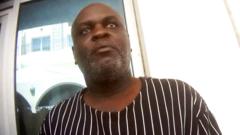Is the Dubai Sex Trade Ring Finally Unraveling After BBC Investigation?

Published: 2025-09-26 16:00:19 | Category: world
This article provides a detailed overview of the recent developments surrounding Charles "Abbey" Mwesigwa, who is accused of operating a sex-trade ring in Dubai that exploited vulnerable women. His detention by UAE authorities has raised significant concerns about human trafficking and the treatment of women in the region.
Last updated: 07 October 2023 (BST)
Key Takeaways
- Charles "Abbey" Mwesigwa has been detained in Dubai, linked to a sex-trade ring exploiting Ugandan women.
- Women were misled into thinking they would find legitimate employment, only to face forced prostitution.
- Interpol Uganda has issued a red notice for Mwesigwa, indicating international law enforcement interest.
- Human trafficking investigations are ongoing in the UAE as authorities respond to the allegations.
- The Ugandan parliament has expressed concern and is seeking justice for the victims involved.
Background on the Investigation
The BBC's investigation into the operations of Mwesigwa revealed a disturbing pattern of deception and exploitation. Vulnerable young women from Uganda were persuaded to travel to Dubai with promises of employment opportunities, only to find themselves ensnared in a network that forced them into prostitution. The allegations indicate a systematic approach to human trafficking, where victims were lured under false pretences.
Details of Mwesigwa’s Detention
Mwesigwa's detention in the UAE comes after a BBC investigation exposed his activities and the extent of the operation he allegedly ran. Filmed during an undercover interview, he claimed he could provide women for sex parties at a starting price of $1,000 (£750), stating that the women were willing to comply with almost any client request.
Legal Context and Charges
As of now, it remains unclear what specific charges Mwesigwa is facing. The lack of transparency from UAE authorities has raised questions regarding the legal proceedings. A Dubai law firm confirmed that Mwesigwa is being held at the Central Prison Centre in Al Awir, and a red notice from Interpol Uganda indicates a serious level of international concern regarding his activities.
Human Trafficking Allegations
The testimonies from women who fell victim to Mwesigwa's network paint a harrowing picture. Many arrived in Dubai believing they would work in reputable jobs, such as in supermarkets or hotels. Instead, they found themselves in dire situations, often indebted and forced into sexual exploitation. Prostitution is illegal in Dubai, yet reports suggest that this operation thrived under the radar.
Victims' Experiences
One victim, referred to as "Mia" for her safety, shared her traumatic experience, detailing the degrading treatment she endured. The allegations include accounts of clients demanding humiliating acts, illustrating the severe abuse faced by these women. The emotional and psychological toll on the victims is profound, highlighting the urgent need for protective measures and legal reforms.
Connections to Recent Tragedies
Sadly, the investigation also uncovered two tragic incidents linked to Mwesigwa's network. Two women, Monic Karungi and Kayla Birungi, reportedly fell from high-rise apartments, with their deaths ruled as suicides. However, their friends and family believe that the circumstances warrant a more thorough investigation, suggesting a potential connection to the abusive environment created by Mwesigwa's operations.
Government and International Response
Following the revelations, Ugandan officials have expressed their alarm. Discussions in the Ugandan parliament highlighted the need for collaboration with Interpol to ensure that justice is served for the victims. There is a growing awareness of the need to address human trafficking both locally and internationally, with calls for increased vigilance in protecting vulnerable populations.
What Happens Next?
As investigations continue, the spotlight remains on both the UAE and Uganda's responses to these allegations. The outcome of Mwesigwa's case could set a significant precedent in how human trafficking is addressed in the region. Authorities in Uganda are expected to pursue further investigations, urging a comprehensive approach to tackling this issue and supporting the victims involved.
Conclusion
This disturbing case underscores the vulnerabilities faced by women seeking better lives abroad. It highlights the pressing need for stronger legal frameworks and protective measures to prevent human trafficking. As international attention focuses on Mwesigwa's detention, there is hope for justice for the victims and a renewed commitment to combat this pervasive issue.
How can we better protect vulnerable individuals from exploitation in the future? #HumanTrafficking #JusticeForVictims #EndExploitation
FAQs
What is human trafficking?
Human trafficking is the illegal trade of people for the purposes of forced labour, sexual exploitation, or other forms of exploitation. It often involves coercion, deception, or abuse of power.
What are the signs of human trafficking?
Signs may include individuals appearing fearful, withdrawn, or showing signs of physical abuse. They may lack control over their identification documents and have limited freedom of movement.
What legal actions can be taken against human traffickers?
Legal actions can include criminal charges for trafficking, exploitation, and related crimes. Penalties vary by jurisdiction but often include significant prison sentences and fines.
How can victims of human trafficking seek help?
Victims can seek help from local law enforcement, non-governmental organisations, or hotlines dedicated to human trafficking. Support services often provide legal, medical, and psychological assistance.
What should I do if I suspect someone is a victim of human trafficking?
If you suspect someone may be a victim, report your concerns to local authorities or dedicated hotlines. It’s important to approach the situation with care and avoid confronting the individual directly.



